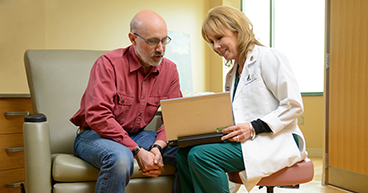
When a loved one is diagnosed with cancer, it’s normal to feel unprepared and unsure about how to react. Here are some tips for communicating with loved ones who have cancer:
Follow their lead. Let your loved one set the tone about what he/she wants to talk about. If you aren't sure what to talk about, just ask. Chances are your loved one wants to feel as normal as possible. Don't assume your loved one can’t handle an open, honest discussion.
Don't minimize their experience. Try not to say things like "Don't worry, you'll be fine." You don't know that. Instead say, "I'm really sorry" or "I’m here for you." Try not to downplay what your loved one is going through. Leave the door to communication open so he/she can talk about his/her fears and concerns.
Stay connected. Cancer can be lonely and isolating. Don’t avoid your loved one because you don’t know how to handle the situation. You can say things like: “You are not alone in this, I’m here for you,” or “I love you and we will get through this together.” It's even okay to say, "I don't know what to say.”
Stop and listen. Sometimes just listening to your loved one, without judgment, is the best thing you can do. You don't always have to find a solution or fix everything. Your loved one may not want to talk at all, and would rather sit quietly. It's okay to sit in silence.
Don’t preach to them. Everyone does cancer his/her own way. Don't tell your loved one what to think, feel or how to act. You don’t know what your loved one is going through, so don’t act like you do. Avoid saying things like: “Stay positive,” or “Keep fighting.” If your loved one gets worse, you don’t want him/her to feel that he/she didn't fight hard enough.
Accept bad days. At times, your loved one may be depressed, angry, or just have a bad day. It's unrealistic to expect your loved one to stay positive all the time. It will only cause more frustration, guilt and stress for him/her. Accept the bad days, give your loved one space when he/she needs it and try not to take things personally.
Respect their independence. Your loved one probably wants to feel as independent and in control as possible right now. Allow him/her to decide what he/she can and will do. Encourage your loved one to be as self-sufficient as he/she wants to be. Provide choices whenever possible.
Take a break from cancer. It doesn't always have to be about cancer. You and your loved one may need a break from cancer every once in a while. Try not to bring up the subject unless your loved one wants to talk about it. Instead, focus on other things, like spending time together doing something fun.
Provide encouragement. Offer encouragement through success stories of long-term cancer survivors. Avoid saying “They had the same thing as you.” No two cancers are the same. Also, try to find other sources of support for your loved one, such as a support group or professional counselor.
Show them you care. Show your loved one that he/she is still needed and loved. Give him/her a hug. Surprise him/her with books, magazines or music. Tell your loved one what he/she means mean to you. Let your loved one know that you still see him/her as a person, not as a cancer patient.



